|
I love Albert Finney but have never been completely convinced by his attempts at an American accent. Even as mob boss Leo in the Coen brothers' Miller's Crossing, a performance I adore, his accent has that slightly artificial twang that American accents always used to have when delivered by British actors before they really learned how to more precisely capture the country's linguistic subtleties and regional variations. Nowadays we watch a new American movie or cable series and only realise an actor is British when we check out his or her IMDb page, but years ago, there was almost always a generic edge to the way British actors tried to pull off an American drawl. And it was almost always a drawl. That said, don't get me started on how painful it once was to hear American actors trying to sound convincingly English or – heaven help us – Scottish.
You'll hear Finney's American drawl at its least authentic in Gumshoe, the 1971 feature debut from director Stephen Frears. The trick is, it genuinely doesn't matter here, as its fakery is very much part of the plot. Finney's character, Eddie Ginley, does not hail from New York or California, but Liverpool, where he works as an MC and bingo caller at a working men's club and has such a cheerfully feckless approach to life that even his psychiatrist tells him to his face that he's a nut. But he dreams of being an American private eye straight out of Raymond Chandler or Dashiell Hammett, a fantasy that prompts him to place an ad to that effect in the local paper and to switch back and forth between his native accent and a play-acted American drawl almost on a whim. To his surprise, the ad prompts a genuine response, sending him to a room at a plush hotel where an unidentified fat man directs him to a package that he is told contains everything he needs to do the job. Inside is a wad of cash and a photo of a university mathematics student named Alison Wyatt. There's also a gun. Just minutes into his first job and Eddie is out of his depth and unsure exactly what he should do next.
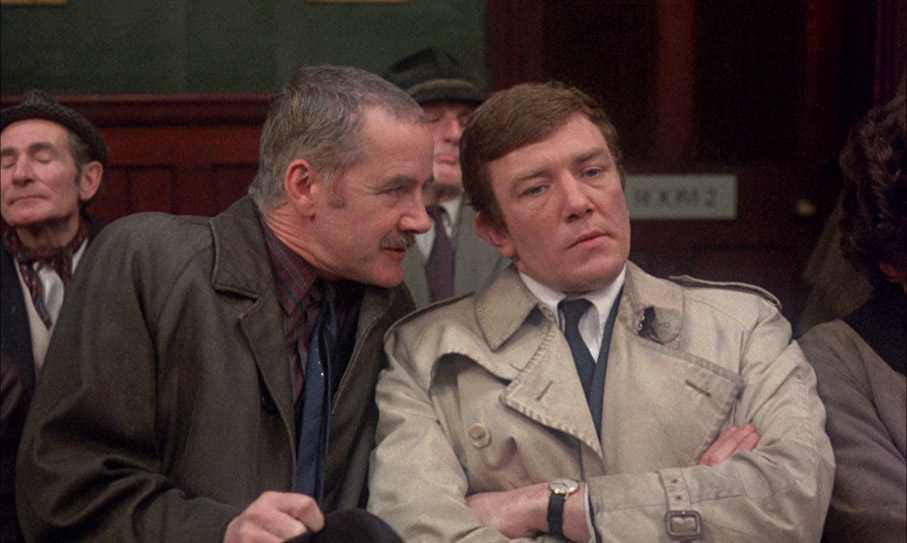
Gumshoe is both a straight-up, 40s-style detective story and a pastiche of one, and unexpectedly scores on both counts and I mean really scores. At the root is a gloriously witty and smartly structured script by Neville Smith that knows when to play it straight, when go for the laughs and just how to combine the two for maximum effect. Genre clichés are flirted with and sometimes cheerfully embraced, and there's plenty of sparkling, Chandler-esque banter, which is given a surreal edge by Eddie's constant accent switching and the fact that no-one ever comments on this, save for the occasional moment when they simply don't understand his cod-private eye patois.
The story is peppered with fully rounded and instantly engaging characters, which are brought to life by a frankly knockout cast. There's the wonderful Billie Whitelaw as Ellen, whom Eddie once loved and still has a thing for with but who instead married his more straight-laced and responsible brother William (Frank Finlay), a successful if dodgy-dealing businessman who holds Eddie in the deepest contempt. Then there's the marvellous Bill Dean as nightclub manager Tommy, whose irritation at Eddie's poor timekeeping is tempered by a genuine affection for the lad. Carolyn Seymour exudes an air of confident mystique as Alison, the curious target of this possible hit, while Oscar James is suitably imposing as her no-nonsense bodyguard, Danny Azinge. Best of all is the splendid Fulton Mackay as Straker, who repeatedly pops up to forcefully remind Eddie that this job was stolen from under his nose, and that unlike Eddie he does this sort of thing for a living. Cinematographer Chris Menges (can this man do no wrong?) keeps the drama grounded in earthy reality whilst also capturing a flavour of the noir thrillers it draws inspiration from, while the most unexpected delight is the score from none other than Andrew Lloyd Webber, a gloriously lush tribute to the high drama orchestral scores of the 1940s. And despite Frears' own claim on this very disc that he didn't really know what he was doing, he marshals all the elements with the confidence and energy of the talented first-time feature director that he clearly was.
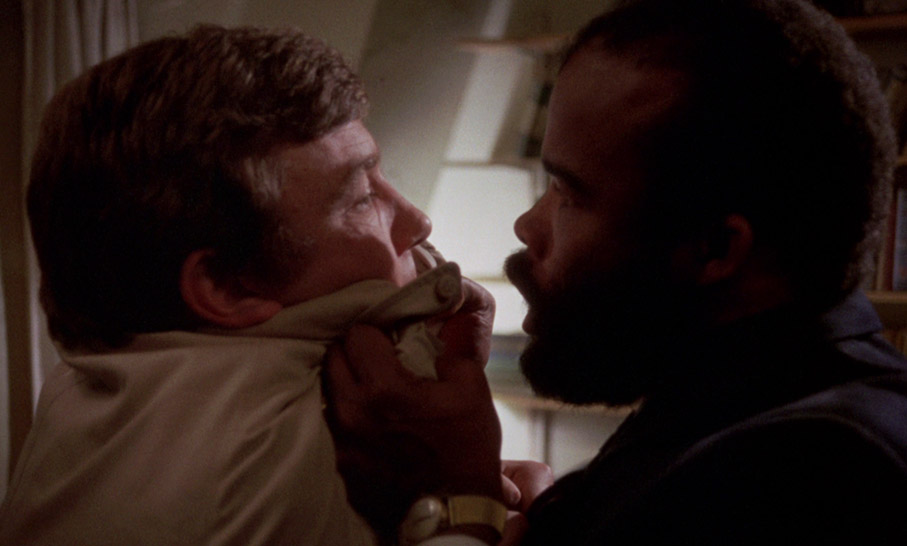
Ideally, I would sign off here with an unreservedly enthusiastic recommendation and encourage all those who've never seen the film to get their hands on this release and becoming acquainted with a terrific and too-little seen work of early 70s British cinema. But there's an aspect of the film that I just can't ignore and that enlightened viewers are likely to be made deeply uncomfortable by, and that's Eddie's flippant racism, specifically his choice of words when talking or referring to black bodyguard Azinge. Initially, it's a taunt – "I'm the great white hope" he tells him at the conclusion of his first meeting with Alison – but it's when Azinge come to his flat to warn him off that the insults really start to fly. "On your way, Mighty Joe Young," Eddie tells him, following it with "When did you come down from the trees?" (to which Azinge neatly responds, "When I saw you crawl from under a stone") and "Get back amongst the bananas, fella." Later he refers to Azinge as "King Kong," "the gorilla," "the Harlem Globetrotter" and "the spade," and the last of those terms is used more than once. While I'd be prepared to let a single racial slur uttered in anger slide as symptomatic of the time in which the film was made, the repeated use of such insults against the only black character in the film with any dialogue makes for intermittently uncomfortable viewing. And maybe I'm reading too much into this, but it struck me immediately that the chosen fake name for the only actual American in the film, Mrs. Blankerscoon (Janice Rule), could with a couple of small changes be reformed into a genuinely unpleasant racial insult (if you're struggling with this one, try changing the N to a C in the name and saying it out loud – I had to rewind and activate the subtitles when Finney first says it because of what I thought I had heard).
Now, I realise we've moved on a bit as a society since 1971, and as Camus handily reminded me, this was the year that Love Thy Neighbour started airing on UK TV, a series whose comedy racism would genuinely drop the jaws of progressive modern viewers. But as someone who was still in school when this film was made and who winced every time a racial insult was thrown at a black classmate, I don't buy into the idea that racism was somehow acceptable behaviour back then. Anti-racist activism was soon to gain serious momentum in opposition to rising support for fascist groups like the National Front, and it's clear that both Stephen Frears and screenwriter Neville Smith are and were genuinely smart people, smart enough, you'd think, to not pass racism off as cod-noir tough-talk. You could argue, of course, that by specifically confining this language to Eddie's dialogue, we're being told something not so nice about him as a character, and that may well be the case. But no-one ever challenges him on this, and given that we're encouraged to bond with this Billy Liar-esque dreamer as he discovers an unexpected sense of purpose to his life, for me this constituted a small but still significant barrier to total engagement. When Eddie is smart-talking and digging into mysteries he's an oddly charismatic and easily likeable amateur private eye, but when he starts dismissing someone due to the colour of his skin, well then – to coin a favourite piece of genre slang – he's just a dick.
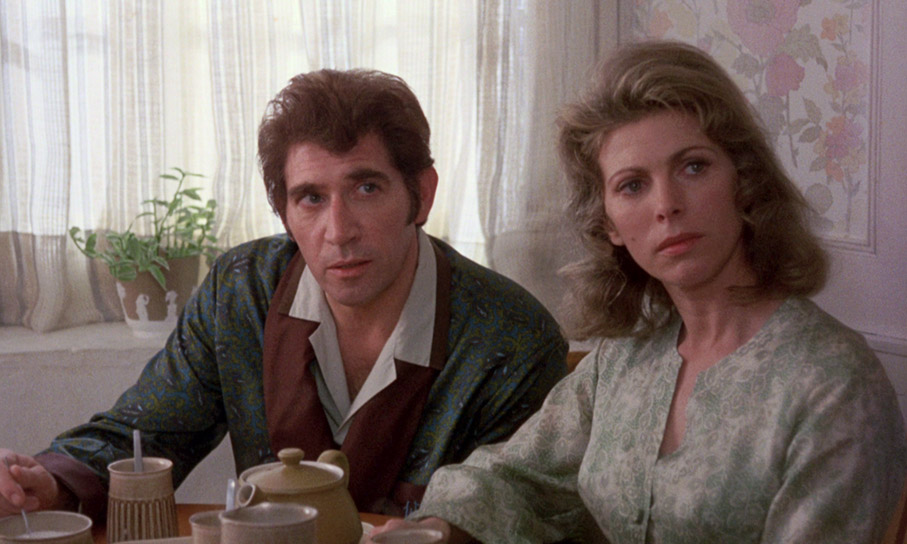
But maybe that's the point. Having watched the film and formed my opinion, I was interested to encounter alternative takes on this in the special features. In his video interview, producer Michael Medwin suggests that we're meant to read Ginley as a man with genuine psychiatric issues, the implication being that the bond we develop with him is meant to be as problematic as the one we form with Taxi Driver's Travis Bickle, another compelling screen anti-hero with racist leanings. In his essay on the film in the accompanying booklet, meanwhile, Robert Murphy makes the case (in the opening paragraph, no less) that Ginley primarily resorts to such insults when backed into a corner, a childish attempt to act tough by being as insensitively offensive as he can. Maybe he's right, and just maybe the fact that Ellen fails to react to his casual racism elsewhere is due to her having heard it so often that she's given up trying to correct him. This is all pure speculation on my part, of course, and in the end is something you'll just have to live and disagree with to appreciate what is still so good and great about what is otherwise a smart, energetically witty and delightfully performed gem of British 70s cinema.
A very attractive 1.66:1 HD transfer that really flatters Chris Menges' rich Eastmancolor cinematography, from the naturalism of daytime exteriors and the inside of houses and offices to the crisp night-time imagery and the more colourful scenes in the working men's club. There's a strong level of clearly defined detail and the contrast is nicely pitched, nailing the black levels without punishing the detail in darker areas, and a fine film grain is visible. There's almost no trace of dirt or any former damage, but there is one shot when Ginley meets Alison at the labour exchange where the quality of both the picture and sound drop substantially – we can presume this was the best version of this particular shot that could be found during the restoration process.
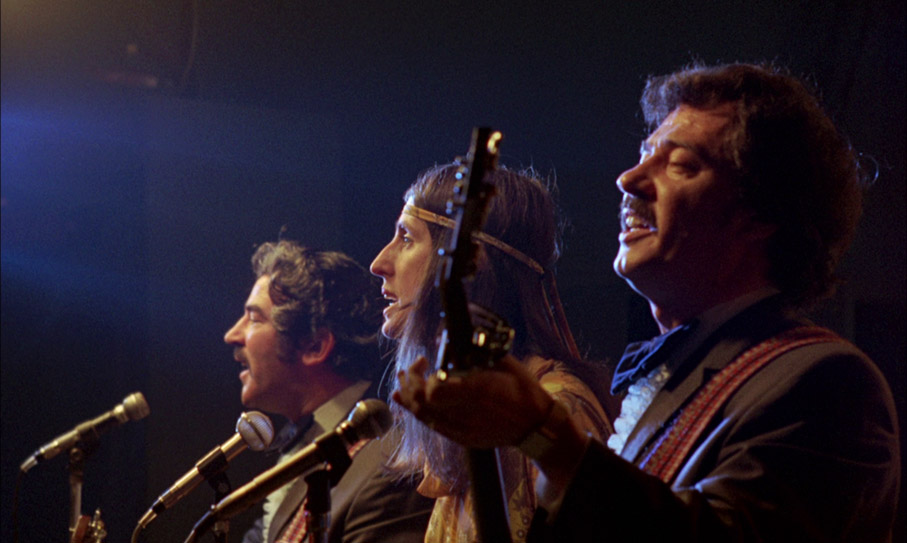
The Linear PCM mono 1.0 track is clear and clean of faults (the above-mentioned brief drop in quality aside), with clear reproduction of dialogue and a pleasingly lively rendition of Andrew Lloyd-Webber's score.
Optional subtitles for the deaf and hearing impaired are available.
Stephen Frears on Gumshoe (17:44)
A typically chatty and self-effacing Frears looks back at his early days in the film industry working for Karel Reisz on Morgan: A Suitable Case for Treatment and Albert Finney on Charlie Bubbles, making his debut short as director, The Burning (see below) and his time making children's films for TV. The process of getting Gumshoe to the screen is covered in some detail, and the main cast members get some coverage too. He reveals that he asked Bernard Herrmann to score the film, but that he declined because there were too many close-ups. He claims that it took him another ten years to learn how to make films properly.
Neville Smith on 'Gumshoe' (15:44)
Screenwriter Neville Smith recalls first meeting Frears and claims that listening to him and producer/director Michael Apted talk was a little like listening to a cricket match commentary. He talks in some detail about the writing of the screenplay and reveals that he was carted off by filmmaker Maurice Hatton to a vicarage in order that he be able to write in isolation, which wasn't easy when Frears and Hatton were playing football on the lawn outside. He tells us about a legendary figure within the industry who could tell the length of a film simply by weighing the script (the accepted wisdom now is simply to check the number of pages) and appreciated being on set for the making of the movie, something of a rare treat for screenwriters.
Producer Michael Medwin on 'Gumshoe' (1:51)
The first of three micro-interviews with members of the film's cast and crew, here producer Michael Medwin describes the film as a witty pastiche of Chandler, albeit one that he believes didn't really have an ending (I really liked the light-hearted final scene). He also suggests that Albert Finney, while wonderful in the role, really needed a lighter touch. You reckon?
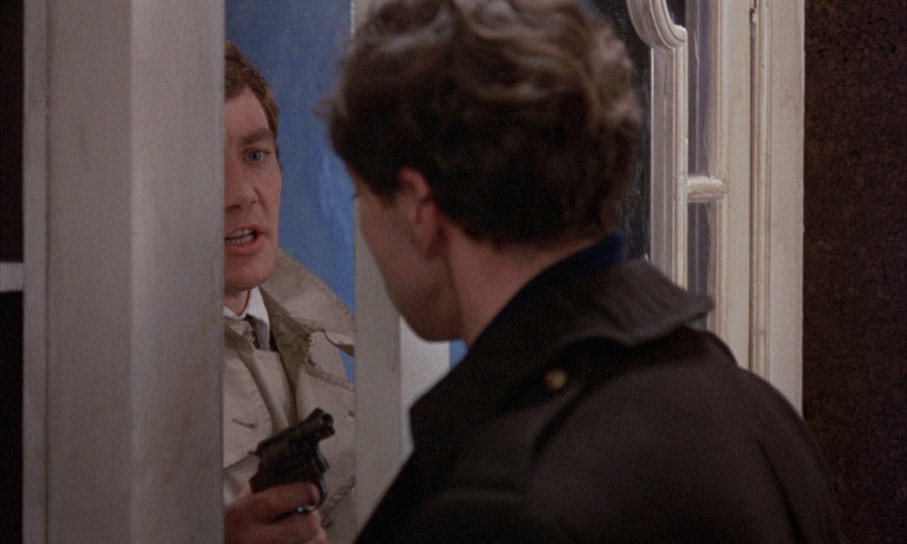
Editor Charles Rees on Gumshoe (25:12)
If you're interested in the minutiae of the editing process, then this one's for you, as Gumshoe's editor Charles Rees reflects in considerable detail on his obsession with identifying exactly which frame you should cut on, which led to an approach he regards as the editing equivalent of The Method for actors. He reveals that Columbia were unhappy with some aspects of the film as presented to them, which is why supervising editor Fergus McNeil was brought in to make some changes after he had left the film. He repeatedly praises Neville Smith's screenplay, and intriguingly suggests that Ginley is a sick man, and that Finney's ambiguous portrayal kept us guessing about just how sick.
Actor Tom Kempinski on 'Gumshoe' (1:33)
In the second micro-interview, actor Tom Kempinski recalls his brief role as Ginley's psychiatrist, a part he saw primarily as a money-earning job.
The Burning (31:54)
A neat grab for Indicator, this was Stephen Frears' first stab at directing – he claims that he didn't know what he was doing at the time, but the confidence with which the film is directed belies that. Adapted from a collection of short stories by Roland Starke, The Burning is set during a period of social upheaval in South Africa, told from the viewpoint of a young white boy named Raymond, who lives in a plush house with his grandmother and their three black servants. As they prepare for a picnic, news starts to arrive of a native uprising, the effects of which are set to impact greatly on the young boy. It's a solidly-made work with uneven performances (I gather cast was primarily non-professional) and a strong use of the monochrome 1.33:1 frame, courtesy of cinematographer David Muir. I was, however, left unsure whether I was being asked to view the family – and by association their loyal servants – as somehow more 'civilised' than the rioting locals (whose savagery delivers the film's climactic body blow), or as over-privileged whites who have insulated themselves so effectively from the society in which they live that they are incapable of understanding a situation that is set to blow up in their faces.
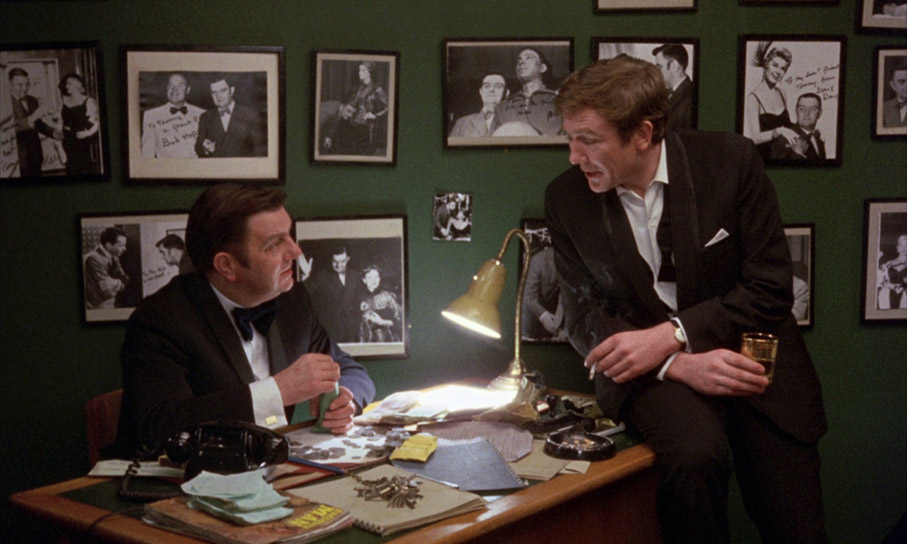
Production Designer Michael Seymour on Gumshoe (2:22)
In micro-interview number 3, widely respected production designer Michael Seymour (the man did Alien, and for that alone he gets our undying admiration) talks briefly about his small crew, the bookshop basement set, and a chase sequence filmed in London's Shaftsbury Avenue, still a familiar location to anyone in the British film industry.
Theatrical Trailer (2:59)
A rather good trailer that captures the style of the film and that makes good use of Lloyd-Webber's score.
VHS Trailer (2:43)
A more po-faced trailer that presents the film more as a serious detective thriller and gives no hint of its humour or wit.
Image Gallery
26 slides of promotional still and (rather good) posters.
Booklet
Following full credits for the film, we have the aforementioned essay by Robert Murphy, which takes a considered and detailed look at the film and intriguingly casts it as Get Carter's little brother. Up next is an article published in the 1970/1971 Winter issue of Sight and Sound (back then it was put out only four times a year) in which David Robinson writes about his experience visiting the set during filming. This is followed by a quote from Billie Whitelaw on working with Albert Finney and Stephen Frears on Charlie Bubbles and Gumshoe, and a number of contemporary reviews, all of which are positive.
A real treat of a film marred a little by an aspect that has dated painfully, one not by any means unique to this film, but which stings precisely because the rest still works so damned well. It's an aspect you'll have to live with to enjoy the many treasures the film still has to offer, and it's handsomely served by Indicator's typically excellent Blu-ray. With the above stated proviso, warmly recommended.
|